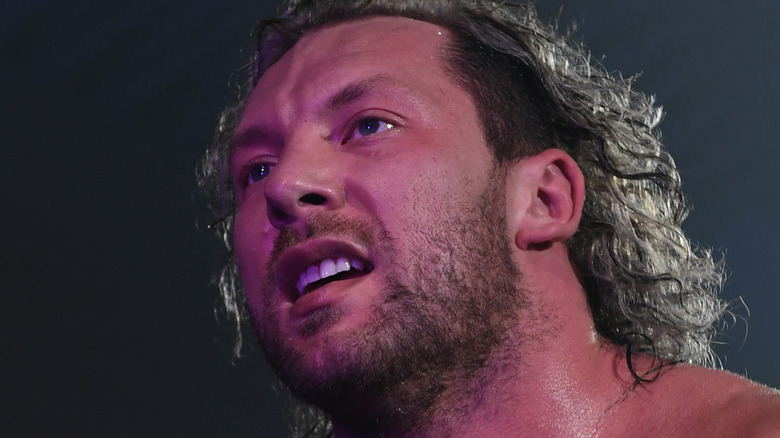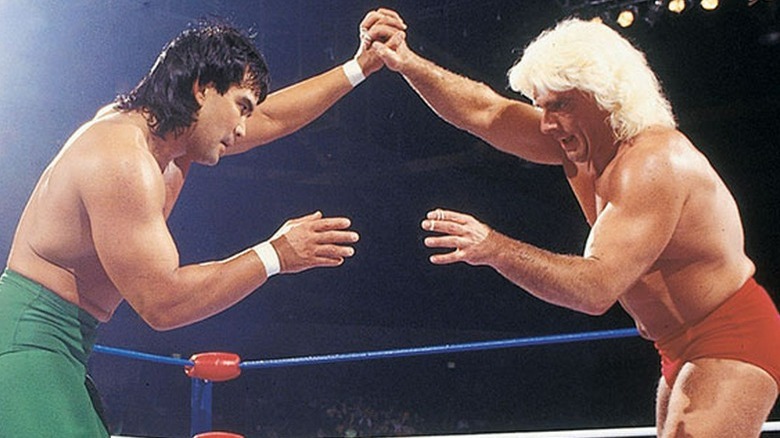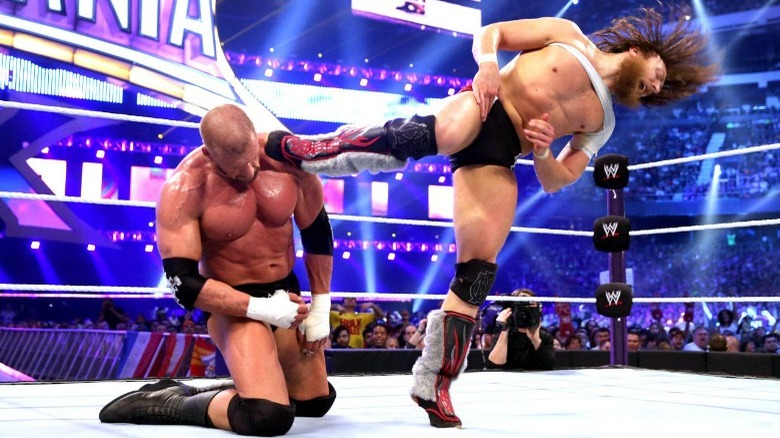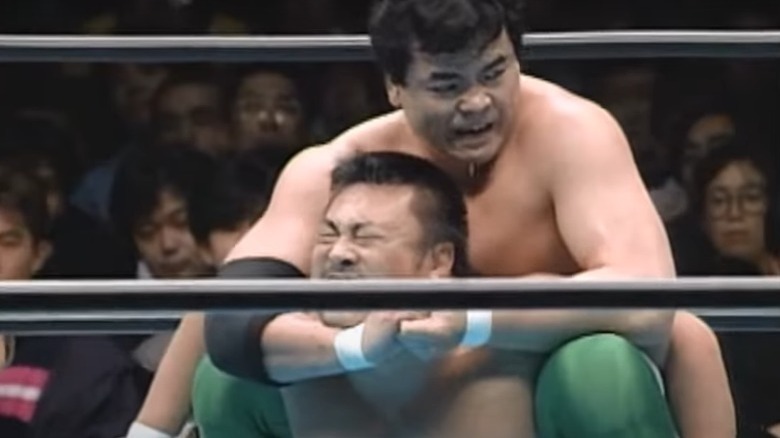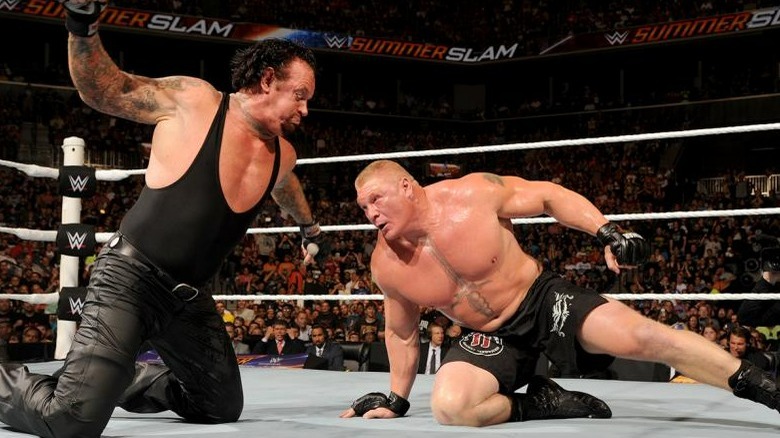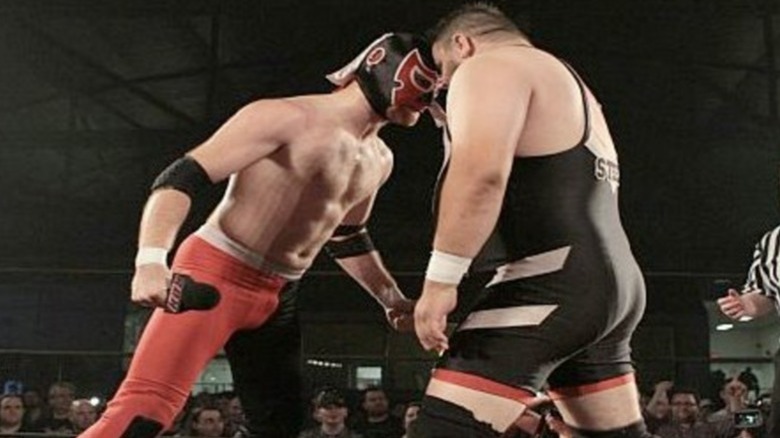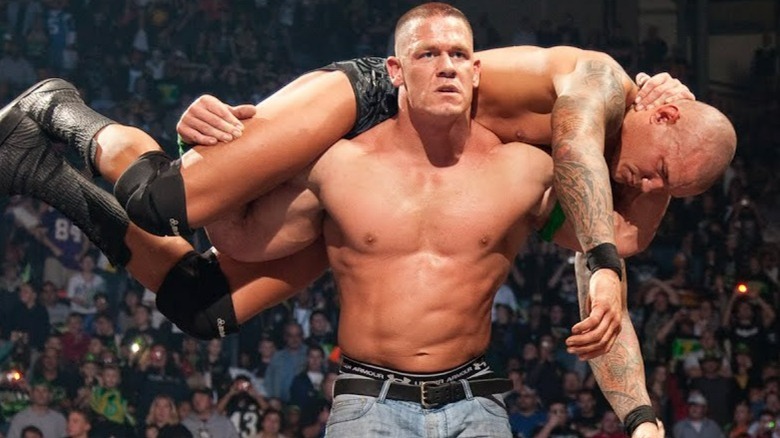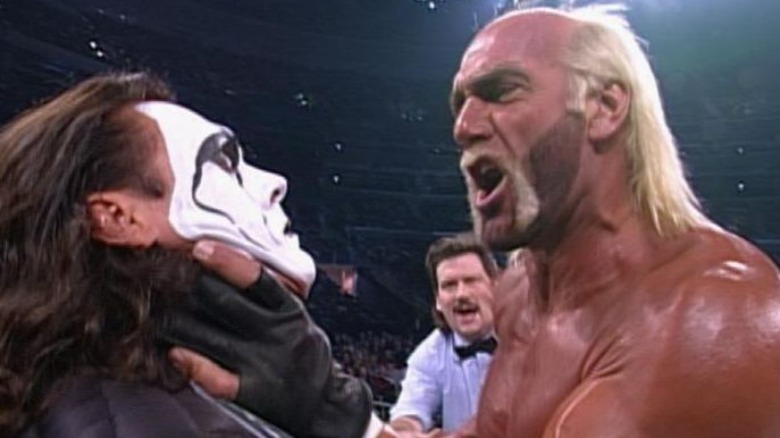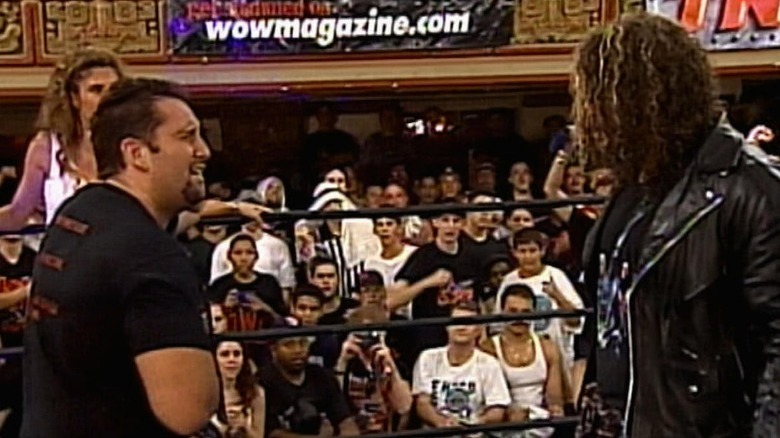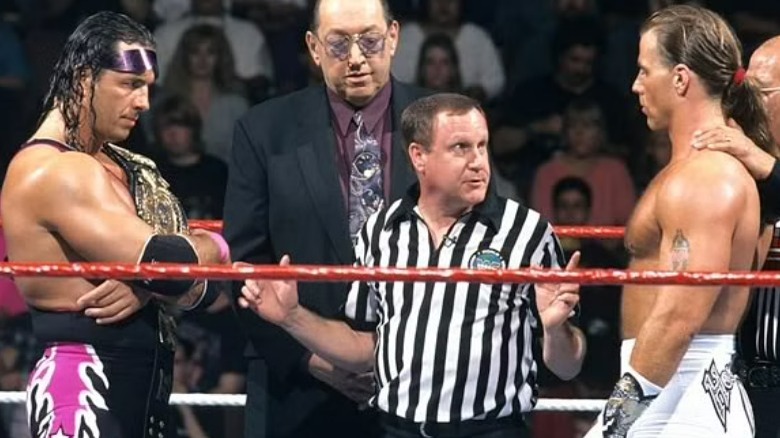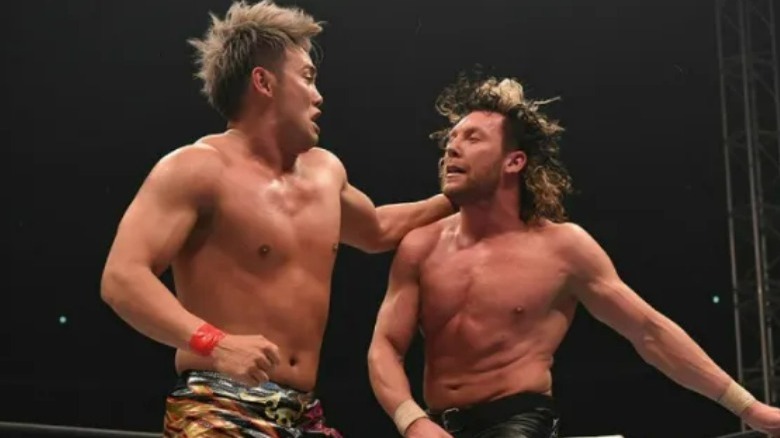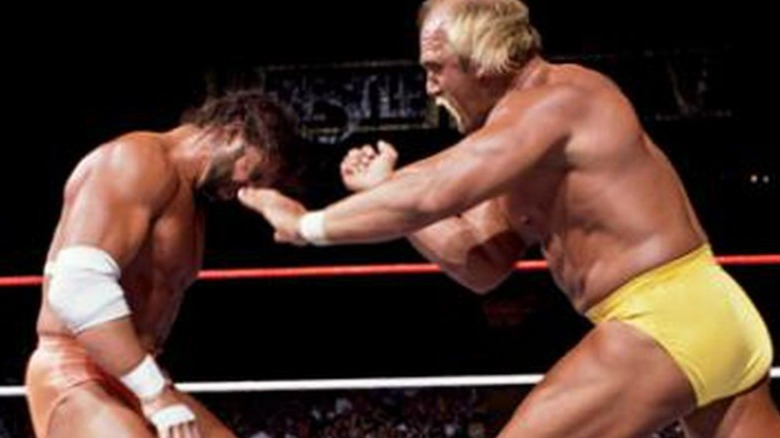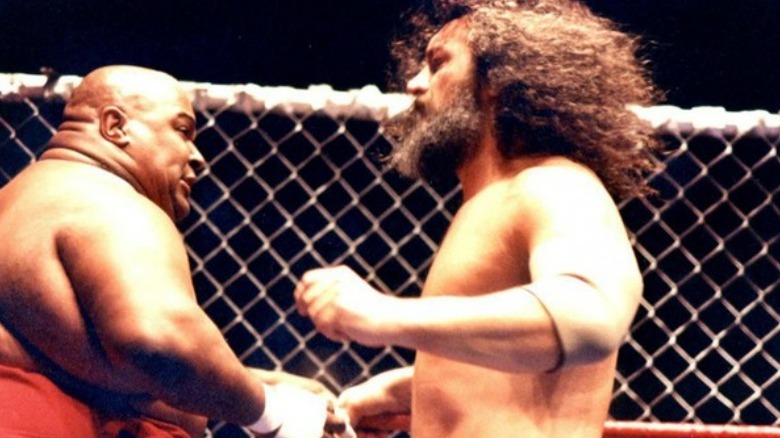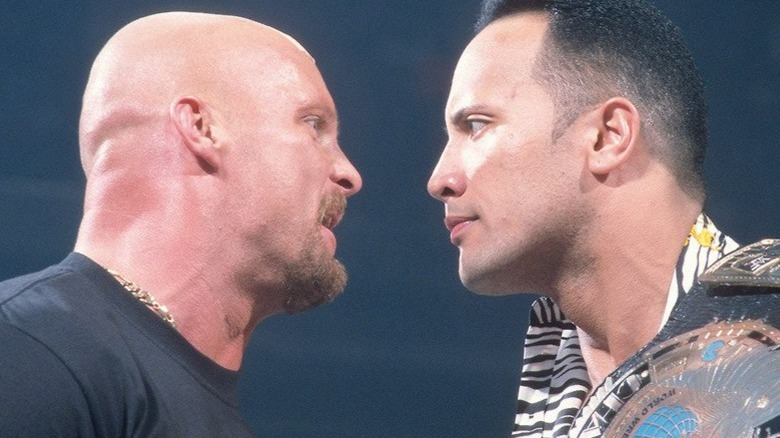The Most Legendary Wrestling Feuds Of All Time
Many things come together to make professional wrestling fun to watch. Depending on who you ask, larger-than-life characters, spectacular events, endlessly quotable promos, and more all play a pivotal role in getting fans to tune in week after week. Although, when taking a look at what really drives most wrestling fans to check out the likes of WWE, AEW, Impact, and more, one would be remiss not to give the storylines and the in-ring matchups they spawn a seat at the table.
For decades, rivalries have endured as the lifeblood of pro wrestling, regardless of the promotion in question. They serve as the connective tissue between separate matches and enhance the experience for those watching, adding a specific atmosphere to a contest. Some are about championship gold or professional pride, while others are over things as mundane as shampoo commercials. Some deserve to be remembered and revered, and others are better off fading into obscurity.
However, a select few across wrestling history have put wrestlers together who managed to create genuine magic inside the ring. These are some of the most legendary wrestling feuds to ever unfold.
Ricky Steamboat vs. Ric Flair
When looking back at the rich history of the National Wrestling Alliance and World Championship Wrestling, one will find that each hosted countless classic rivalries, especially in the late 1980s and early 1990s. But few have withstood the test of time quite like Ricky "The Dragon" Steamboat vs. "Nature Boy" Ric Flair, whose rivalry truly began in February of 1989 at the NWA Chi-Town Rumble event. The two would put on an absolute clinic that saw Steamboat walk away as the NWA World Heavyweight champion and kickstart a program that would dazzle audiences for the next few months.
With Steamboat depicted as a down-to-Earth family man who finally won the big one and Flair as a stylin', profilin', son-of-a-gun who wants his title back, the story practically wrote itself. Their big rematch would come at NWA Clash Of The Champions #6 – "Ragin' Cajun" in March of '89 — a bout that earned the Wrestling Observer's Match of the Year award that year — where Steamboat would come out the victor. Flair would win the NWA title back in the final installment of their trilogy at NWA WrestleWar 1989 – "Music City Showdown." Pro Wrestling Illustrated labeled this bout its 1989 Match of the Year.
This particular feud between Ricky Steamboat and Ric Flair would part ways after WrestleWar, but their story didn't end there. The two would engage in a string of thrilling matches under the WCW banner in 1994, and they nearly squared off again in 2022 for Flair's retirement match. Sadly for old-school wrestling fans, Steamboat chose to turn the offer down (via the Wrestling Observer).
Daniel Bryan vs. The Authority
Corrupt authority figures have been a part of wrestling for decades, abusing their power and going out of their way to frustrate on-screen talent and fans. Therefore, when someone steps up to challenge their tyranny, you can count on some entertaining television. One of the most well-execute examples came about in the 2010s, featuring underdog and fan-favorite Daniel Bryan boldly stepping up to WWE's corporate overlords and their allies, known collectively as the Authority. This almost year-long story earned Pro Wrestling Illustrated's 2013 Feud of the Year award, and for good reason.
It all began at SummerSlam 2013 when Triple H cost Bryan the WWE Championship. In the months that followed, Bryan would continue to clash with The Game as well as his allies, Randy Orton and The Shield. However, with WrestleMania XXX on the horizon, the Authority began to shift its focus away from Bryan, who — as Bryan told Newsday — wasn't booked anywhere near the unified WWE World Heavyweight Championship or the main event. Nevertheless, his legions of devoted fans couldn't be ignored, leading him to wrestle and win two matches at the landmark event — the first against Triple H and the second against Orton and Batista.
The Daniel Bryan-Authority angle peaked with Bryan's WrestleMania XXX title win, since Bryan had to give up the title due to a neck injury after a lone defense against Kane at Extreme Rules 2014. It was an unceremonious end for a story that fans largely willed into existence, but as they say, sometimes it's not about the destination. It's about the journey.
Mitsuharu Misawa vs. Toshiaki Kawada
More often than not, wrestling storylines are entirely fictitious, created for the sole purpose of entertaining the fans. Every now and again, though, real-life animosity can seep its way into these TV narratives, giving rivalries some added thrust. In the case of the Mitsuharu Misawa vs. Toshiaki Kawada feud — one that produced some of the most hard-hitting matches to ever take place between the ropes — legitimate professional tension went an especially long way in making their saga a sight to behold. As a result, it still holds a special place among wrestling's greatest rivalries.
High school friends and former tag team partners, Misawa and Kawada first found themselves as adversaries in All Japan Pro Wrestling in 1993. Consumed by a need to prove himself after spending years in Misawa's shadow, Kawada shockingly split from the Super Generation Army — a supergroup of up-and-coming babyfaces like Misawa and Kenta Kobashi — to align with Akira Taue, a rival and a former member. What ensued was a series of legendary tag and singles matches between Misawa and Kawada throughout 1993, '94, and '95. These bouts never disappointed, especially their battle at the 1994 Super Power Series, which earned a staggering six-star rating from the Wrestling Observer (via Cage Match).
After consistently coming up short, Kawada got a singles win over on Misawa at the 1997 Carnival Finals, and followed it up with another in May of 1998 for the Triple Crown Heavyweight Championship. He'd pull off a third win in January of 1999, earning the Triple Crown once again. Their final confrontation came in 2005 at Pro Wrestling NOAH Destiny, and though their best years were behind them, they put on a great show nonetheless. As per usual during their glory days, Misawa took home the victory, but even in defeat, Kawada gave his old rival a proper run for his money.
Undertaker vs. Brock Lesnar
With a WWE career spanning 30 years, the Undertaker has engaged in feuds with a who's who of wrestling legends. Shawn Michaels, Triple H, Kane, and more found themselves across the ring from the Deadman on numerous occasions, amounting to some incredible stories and confrontations for fans to enjoy. Still, few, if any, of Taker's notable rivalries are on the same level as the one between him and Brock Lesnar. Their matches weren't technical masterpieces, nor did both men lock up often, but few are quick to forget their bouts and the circumstances that led to them.
Lesnar and the Undertaker's first encounters date back to 2002 and 2003, where they'd clash over the WWE Undisputed Championship. After their Biker's Chain match at No Mercy 2003, they wouldn't square off one-on-one again until 2014. At WrestleMania XXX in New Orleans, Louisiana, the Beast Incarnate would do the unthinkable: pin the Undertaker clean, ending his 21-0 undefeated streak at the event. Determined to regain his honor, Taker took the fight to Lesnar at SummerSlam 2015 in a winning effort, but would lose their last match at Hell in a Cell two months later.
While their series of matches in the early 2000s certainly had their highlights, the Undertaker and Brock Lesnar's 2015 program wasn't crowned Pro Wrestling Illustrated's Feud of the Year for nothing. It sent Lesnar on a championship-winning warpath, showed the Undertaker wouldn't go quietly after the end of his WrestleMania streak, and provided WWE audiences with a story like no other.
Kevin Steen vs. El Generico
Ring of Honor was on fire in the late 2000s and early 2010s, boasting a roster filled with some of the brightest stars in wrestling who'd put together one fantastic match after another. Two of these young workhorses were El Generico and Kevin Steen, who rose to prominence on the independent wrestling scene thanks to their exciting in-ring styles and engaging personas. They eventually decided to pool their skills as a tag team, but as the case tends to be in wrestling, their alliance met a disastrous end. Steen turned his back on Generico at Final Battle 2009, and before you knew it, they were off to the races.
In the years that followed, El Generico and Kevin Steen would trade victories in both singles and tag matches. They'd even take their animosity to other promotions such as Pro Wrestling Guerrilla, where they'd toss the PWG World Championship into the mix. By 2012, Steen had earned his place as Pro Wrestling Illustrated's Most Hated Wrestler of the Year, making Generico a white-hot babyface. One would imagine that this would make his loss to Steen in their Final Battle 2012 Ladder War — their last indie bout — rather deflating, but the match was so entertaining that one couldn't help but applaud them both.
Under the WWE banner, Kevin Steen and El Generico (renamed Kevin Owens and Sami Zayn, respectively) have rekindled their rivalry at events like WWE NXT Takeover: Unstoppable and Battleground 2016. These matches were fine, but they couldn't quite measure up to those they competed in on the independent circuit.
John Cena vs. Randy Orton
Even in its final years, WWE's Ruthless Aggression Era, which ran from approximately 2002 to 2008, continued to showcase memorable matches and feuds. Both "Raw" and "SmackDown" delivered in these regards, but the former found something really special in its program that pit John Cena against Randy Orton. They'd faced off before in tag and the occasional singles matches, but their rivalry didn't truly commence until 2007 when the two went head-to-head in a string of matches for the WWE Championship. However, Cena would sustain a pectoral injury that put the whole thing on hold for months on end.
Unsurprisingly, that bump in the road wasn't enough to keep Cena out of commission for good. He'd reignite his feud with a more aggressive Orton on the road to WrestleMania XXIV after making a shocking return at the 2008 Royal Rumble. Though they'd somewhat drift apart in the wake of WrestleMania, come 2009, they'd headline more pay-per-view events, such as Night of Champions, SummerSlam, and Breaking Point. This year proved the arguable peak of their rivalry, with Orton-Cena matches becoming a rarity as the 2010s wore on.
John Cena and Randy Orton's feud throughout the late 2000s cemented both of them as top stars in WWE. Cena's superhuman comeback story and strong in-ring showings further proved he could be the face of the company, while Orton's transformation into the ruthless, twisted Apex Predator showed he was the perfect foil for the Cenation leader. Without this rivalry, neither of their careers would've been the same.
Sting vs. the nWo
In the years since WCW closed its doors in 2001, it has taken a reputation as a cautionary tale of how not to succeed in the world of wrestling. From angles that included Chucky from "Child's Play" playing mind games with Rick Steiner to gimmicks like the failed yet pricey KISS Demon, it's hard not to focus on the company's missteps during the Monday Night Wars. At the same time, it's worth remembering that for all of WCW's flaws, the promotion wasn't totally incapable of telling satisfying, long-term stories. The legendary feud between Sting and the nWo for the soul of WCW is one such example.
As the nWo ran roughshod over WCW in 1996 and 1997, Sting's look and attitude shifted dramatically. Long gone were the colorful face paint and infectious energy, now replaced with a black and white motif inspired by "The Crow" and a dark, brooding demeanor. He watched from the rafters as the nWo destroyed his home from the inside. Eventually, he had enough, attacking nWo members at random with his trusty baseball bat. WCW's prodigal son eventually returned to the ring at Starrcade 1997 and successfully dethroned "Hollywood" Hulk Hogan for the WCW World Heavyweight Championship.
Sting's rivalry with the nWo caused his already immense popularity to reach new heights — hence why he was crowned Pro Wrestling Illustrated's Most Popular Wrestler of 1997 – as fans clamored to see the heel faction take a decisive loss. He'd continue to be a thorn in its side for years to come and later join the nWo Wolfpac splinter group in 1998. Although, the Starrcade 1997 match against Hogan — a mess of a match hampered by a fast count that wasn't actually fast, a restart, and Bret Hart's late inclusion as the special referee – was the pinnacle of the feud.
Tommy Dreamer vs. Raven
An alternative to the likes of the WWF and WCW in the truest sense, Extreme Championship Wrestling was a breath of fresh air throughout the late 1990s and early 2000s. If you liked over-the-top violence, grounded characters, and attention-grabbing stories, it was certainly the place for you. While it's not everyone's cup of tea, one should at least recognize that it hosted some of the greatest feuds in professional wrestling history. If you only check out one, make sure it's Tommy Dreamer vs. Raven – a lengthy saga that captivated ECW fans for years on end.
The story goes that back during their childhood, Raven and Dreamer were enemies during their time at summer camp. Dreamer would constantly pick on Raven for being an outcast, amounting to a deep resentment to build in the latter. Beulah McGillicutty would align with Raven since Dreamer treated her poorly back in the day, too. Despite a clear desire from fans to see Dreamer come out on top, Raven would continuously defeat his old rival from 1995 to 1997. It took Raven departing ECW for WCW for Dreamer to finally score a singles win, which took place at Wrestlepalooza 1997 in a Loser Leaves Town match.
Long after both ECW and WCW closed their doors, Tommy Dreamer and Raven would continue to lock up in various wrestling promotions. However, while it was great to see these two hardcore legends duke it out for old times' sake, nothing could conjure the magic of their initial run. The matches themselves, the morally ambiguous story, and the clear passion put into it all by those involved could never be recreated.
Bret Hart vs. Shawn Michaels
In the mid-1990s, the WWF was in a rough spot. The New Generation Era, which carried on the promotion's colorful, kid-friendly nature of the '80s, had worn thin with the audience. They were changing the channel to the more reality-based, edgy WCW Monday Nitro, meaning the WWF crew was in trouble. Thankfully for them, their product wasn't totally unwatchable. After all, they still had Bret "Hitman" Hart and "The Heartbreak Kid" Shawn Michaels on the roster, whose respective skills in the ring and real-life dislike for one another made for some unforgettable matches and moments.
Once friends behind the scenes, Hart and Michaels' personal rapport began to deteriorate around 1996. A combination of their desires to be the best in the game along with Michaels' increasing arrogance and backstage shenanigans put an end to their once-friendly relationship. As a result, they didn't wrestle too often, but when they did, neither man backed down. Their Iron Man match at WrestleMania XXII and, besides its controversial finale, their Survivor Series 1997 clash are highly entertaining. It's just too bad that the infamous Montreal Screwjob ended their on-screen feud prematurely.
As the 2000s became the 2010s, Bret Hart and Shawn Michaels put their rivalry to bed personally and later in storyline on the January 4, 2010 edition of "Raw." Thus, the story of two of pro wrestling's greatest enemies came to an end. Still, it's doubtful that the memories of their feud will fade any time soon.
Kenny Omega vs. Kazuchika Okada
New Japan Pro-Wrestling boasts a stellar track record of noteworthy matches and rivalries dating back to its establishment in 1972. While any number of these feuds could lay claim to being the very best the promotion has to offer, it stands to reason that most of them would have a hard time overtaking Kenny Omega vs. Kazuchika Okada. All four of their matches delivered on all fronts and solidified both competitors as two of the absolute best to ever step foot in a NJPW ring — or any other, for that matter.
Okada and Omega's first singles confrontation came in 2017 via NJPW's Wrestle Kingdom 11 in a match for the former's IWGP Heavyweight Championship. The thrilling back and forth contest saw Okada walk away victorious, but in a manner of speaking, neither man lost that night. Dave Meltzer of the Wrestling Observer gave the match a six-star rating, which their next match at Dominion 2017 would surpass a few months later with a six and one-fourth score. They'd put on another six-star showing at the 2017 G1 Climax (via Cage Match).
One might expect that Okada and Omega's fourth match at Dominion 2018 would be another impressive showing, but that's a massive understatement. This bout once against shattered records when it clocked in at an unprecedented seven stars and earned Pro Wrestling Illustrated's Match of the Year award in 2018 — one of many accolades the Omega-Okada feud earned from the publication.
Hulk Hogan vs. Randy Savage
In October of 1987, the wrestling world would see two of the biggest names in the world unite to form one of the most formidable tag teams of all time: "Macho Man" Randy Savage and Hulk Hogan, known collectively as the Mega Powers. These two WWF giants, accompanied by Savage's longtime manager and real-life spouse, Miss Elizabeth, took the company by storm throughout the remainder of the year into 1988. Savage would even secure his first WWF Championship during this run at WrestleMania IV. However, this dream team wouldn't last forever, presenting audiences with an era-defining rivalry.
As they overcame the likes of André the Giant, Big Boss Man, "The Million Dollar Man" Ted DiBiase, and others, tension between Hogan and Savage slowly rose. The latter grew increasingly wary of his partner and his chumminess with Elizabeth, which ultimately consumed him. At The Main Event II in February of 1989, Savage allowed his jealousy to get the best of him and he attacked Hogan — formally ending the Mega Powers. They'd clash at WrestleMania V for Savage's title, and Hogan left the arena that night with the gold. Even still, the Macho Man wasn't done with the Hulkster just yet (via Cage Match).
Throughout the remainder of 1989 and into 1990, Randy Savage and Hulk Hogan would wind up against each other in some form or fashion. Their rivalry would spill over into WCW during the latter half of 1990s as well, but it never again reached the highs that it did around WrestleMania V. Meanwhile, their real-life relationship was complicated, to say the least, but it never got in the way of putting on an entertaining show.
Bruiser Brody vs. Abdullah the Butcher
In the early 1980s, Abdullah the Butcher and Bruiser Brody were two of the biggest attractions in wrestling, and for good reason. Both had unique looks that set them apart from their fellow wrestlers, and they each presented themselves as wild, unhinged men willing to do frightening things to pick up a win. Therefore, it made sense to book these two extreme wrestlers against each other, which happened for the first time on April 10, 1981 in an All Japan Pro Wrestling ring. And so, one of the most bloody and brutal feuds to ever unfold in the squared circle began.
The next seven years saw Abdullah and Brody put each other through the wringer across the globe. Japan, Puerto Rico, Canada, and more got to witness their epic, bloodstained confrontations take place. Whether they were locked inside of a steel cage or tethered together via dog collars, they found new, sadistic ways to inflict pain, which raucous audiences observed in horror. Abdullah-Brody matches often ended in double count out or double disqualification, but that closing bell rarely kept the two adversaries from keeping their fight alive.
Even though their feud was still going strong as the 1990s approached, it abruptly concluded on July 15, 1988 at a World Wrestling Council event. Two days later, Bruiser Brody — real name Frank Goodish — was stabbed multiple times in the locker room and later died of his injuries at the age of 42. It's a tragic end for one of wrestling's hardcore pioneers, yet Brody's legacy and his classics with Abdullah the Butcher will live on for generations.
Stone Cold Steve Austin vs. The Rock
When the Rock and "Stone Cold" Steve Austin first arrived in the WWF in 1996, both men struggled to find their footing. Known as Rocky Maivia and the Ringmaster, respectively, neither the fans nor the powers that be got behind them. With no other option, they both transformed their images for the better. The Rock embraced his ego side and started delivering physical and verbal whoopings, and Austin started drinking beers, stomping mudholes into his opponents, and giving the vile Mr. McMahon more than a few headaches. With the crowd behind them, it was only a matter of time before they crossed paths. When they did, it changed wrestling forever.
Stone Cold and the Rock had their first singles match at 1997's D-Generation X: In Your House, but it was their trio of WrestleMania matches in subsequent years that fans really remember. At the height of the WWF's bold and envelope-pushing Attitude Era, they battled over the WWF Championship at WrestleMania XV in 1999. Come 2001, at WrestleMania X-7, they'd again meet on the Grandest Stage of Them All for the title, with Stone Cold getting his hand held high by the final bell. Finally, at WrestleMania XIX in 2003, the Rock would overcome his rival at the Show of Shows — a match that served as Austin's in-ring farewell until he returned in 2022 to face Kevin Owens at WrestleMania 38.
Between their WrestleMania showdowns, "Stone Cold" Steve Austin and the Rock would square off on various other pay-per-view cards as well as on "Raw" and "SmackDown." In doing so, they and the WWF at large surged in popularity, helping the company overtake WCW during the Monday Night Wars and eventually put their competitor out of business. Not to mention, they set a new standard for what a wrestling feud could be, hence why their battles remain the subject of discussion and appreciation all these years later.
